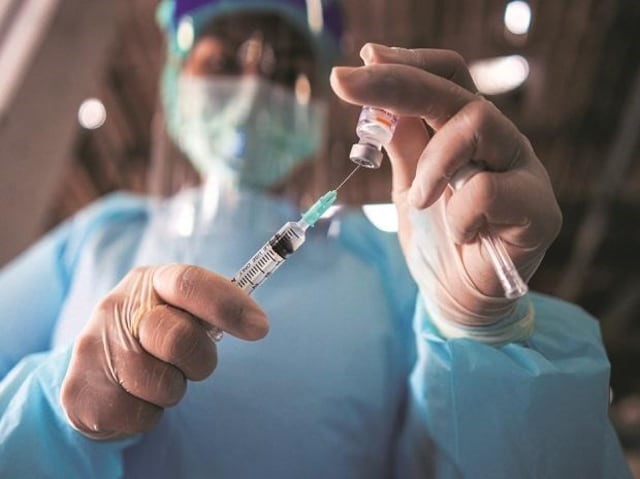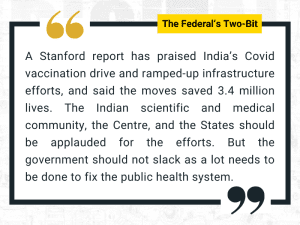
India saved over 3.4 mn lives through COVID-19 vaccination drive: Report

India was able to save more than 3.4 million lives by undertaking a nationwide COVID-19 vaccination campaign at an unprecedented scale, said a report by Stanford University.
The Covid vaccination campaign also yielded a positive economic impact by preventing a loss of USD 18.3 billion, said the working paper by Stanford University and Institute for Competitiveness titled “Healing the Economy: Estimating the Economic Impact on India’s vaccination and related issues”. It was released by Union Health Minister Mansukh Mandaviya on Friday.
Mandaviya said much before COVID-19 was declared a public health emergency by the WHO in January 2020, processes and structures to focus dedicatedly on various facets of the pandemic management were put in place. He virtually addressed The India Dialogue session on the “Economic Impact of Vaccination and Related Matters”.
Also read: Natural COVID-19 infection lowers risk of hospitalisation, death by 88%: Lancet study
Adopted holistic approach
“India under the leadership of Prime Minister Narendra Modi adopted a holistic approach in a proactive, pre-emptive and graded manner, thus adopting a holistic response strategy for effective management of COVID-19,” the minister said.

The dialogue was organised by Institute for Competitiveness and US-Asia Technology Management Centre, Stanford University. The paper discusses the role of containment as a measure to prevent the spread of the virus. It highlights that, as against the top-down approach, a bottom-up approach was critical in containing the virus.
Moreover, the report remarkably notes that robust measures at the ground level, like contact tracing, mass testing, home quarantine, distribution of essential medical equipment, revamping healthcare infrastructure and constant coordination among stakeholders at the centre, state and district levels not only helped contain the spread of the virus but also in augmenting the health infrastructure.
It elaborates the three cornerstones of India’s strategy — containment, relief package and vaccine administration. It observes that these three measures were critical in saving lives and ensuring economic activity by containing the spread of COVID-19, sustaining livelihoods and developing immunity against the virus.
Nationwide vaccination drive
The working paper further notes that India was able to save more than 3.4 million lives by undertaking the nationwide vaccination campaign at an unprecedented scale. It said the vaccination campaign was always on saving lives. However, the campaign also yielded a positive economic impact by preventing the loss of USD 18.3 billion, it added.
A net benefit of USD 15.42 billion occurred for the nation after taking into consideration the cost of the vaccination campaign, the report said. Hailing the decision of early lockdown by the prime minister as a significant turning point, Mandaviya said it enabled the government to leverage community response in its five-pronged strategy namely test, track, treat, vaccination and adherence for implementing Covid Appropriate Behaviour (CAB) and delivering a rapid and robust institutional response to combat COVID-19.
He said that the government focused on augmenting health infrastructure in terms of Covid-related beds, drugs, logistics i.e., N-95 masks, PPE kits and medical oxygen, simultaneously up-skilling human resources though Centres of Excellence and deploying digital solutions such as eSanjeevani Telemedicine service, Aarogya Setu, COVID-19 India Portal etc.
Also read: Chest CT scans reveal lung abnormalities in patients 2 years after COVID
Scaled up testing infrastructure
Equal weightage was given to scaling up the testing infrastructure at an unprecedented rate. Additionally, a network of 52 labs for genomic surveillance was established for monitoring emerging variants of the virus, he added.
The minister stated that building on this momentum, India launched the world’s biggest vaccination drive, garnering a coverage of 97 per cent first dosage and 90 per cent of the second dosage, administering 2.2 billion dosages in all to eligible beneficiaries. The drive focused on equitable coverage for all, hence vaccines were provided free of cost to all citizens, he added.
Campaigns and digital tools such as Har Ghar Dastak, mobile vaccination teams as well as the inception of Co-Win vaccine management platform were leveraged to ensure last-mile delivery, Mandaviya said. A defining factor in the success of pandemic management was allaying fears in the community through targeted information, education and communication, he said.
The Stanford University report reflected that the benefits of vaccination exceeded its cost and suggested that vaccination be considered a macroeconomic stabilising indicator contrary to just a health intervention.
Also read: Organ damage persists in almost 60 pc of long Covid patients: Study
Vaccines crucial in Covid fight
The cumulative lifetime earnings of the lives saved through vaccination (in the working age group) tolled up to USD 21.5 billion, it said.
The report said, “The development of vaccines (Covaxin and Covishield) helped the country fight the pernicious attack of the virus and not only inoculate a large number of people but also decrease the burden on healthcare system.”
Mandaviya said the relief package by the government for people catered to the welfare needs of the vulnerable groups, old-age population, farmers, micro, small and medium enterprises (MSMEs), women entrepreneurs among others and also ensured support for their livelihoods.
With the help of schemes launched to support the MSME sector, 10.28 million MSMEs were provided assistance resulting in an economic impact of USD 100.26 billion which comes out to be about 4.90% of the GDP, he further said.
(With Agency inputs)


